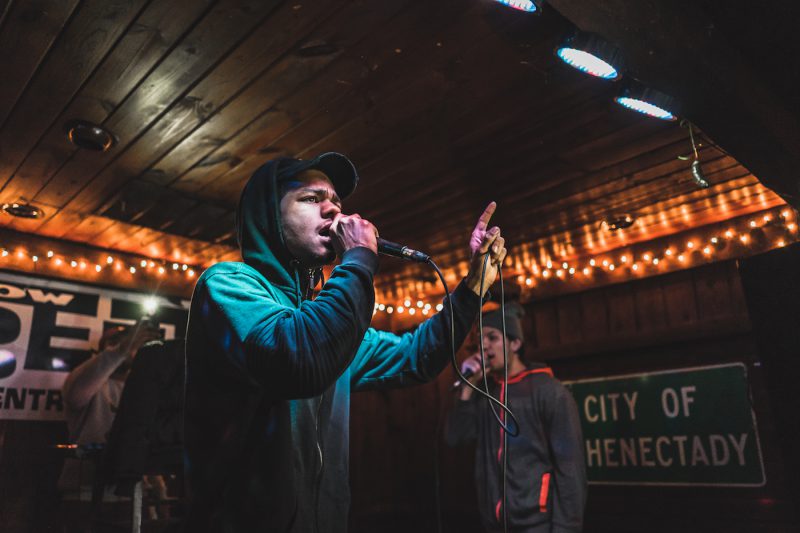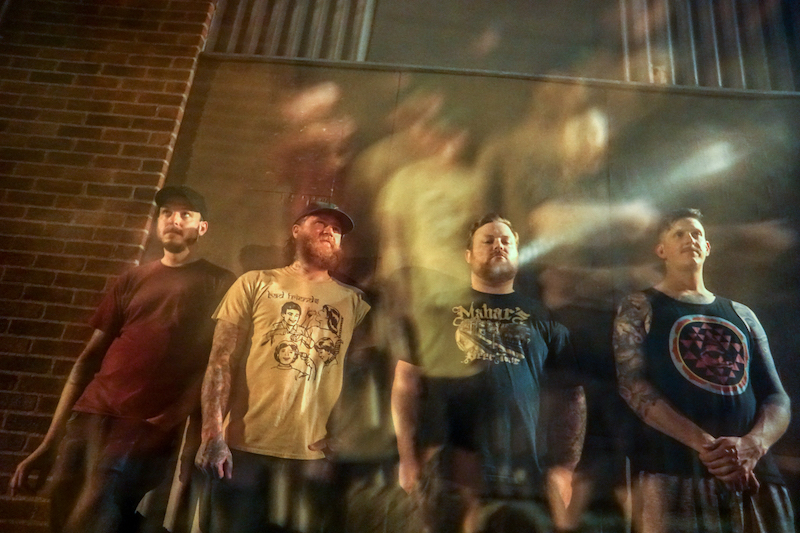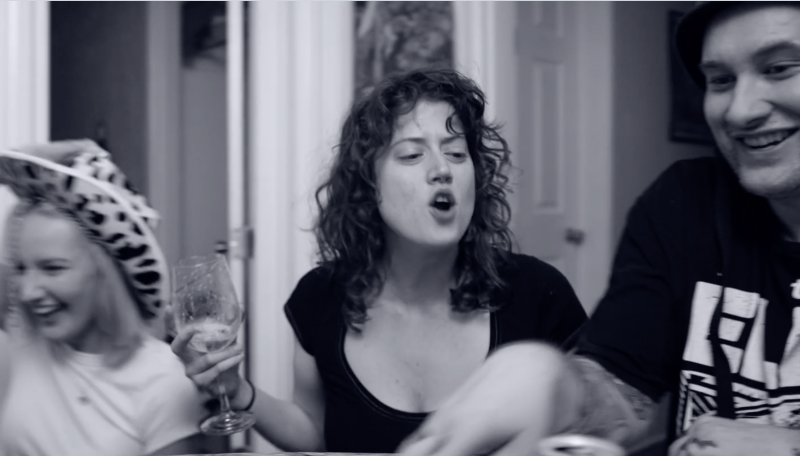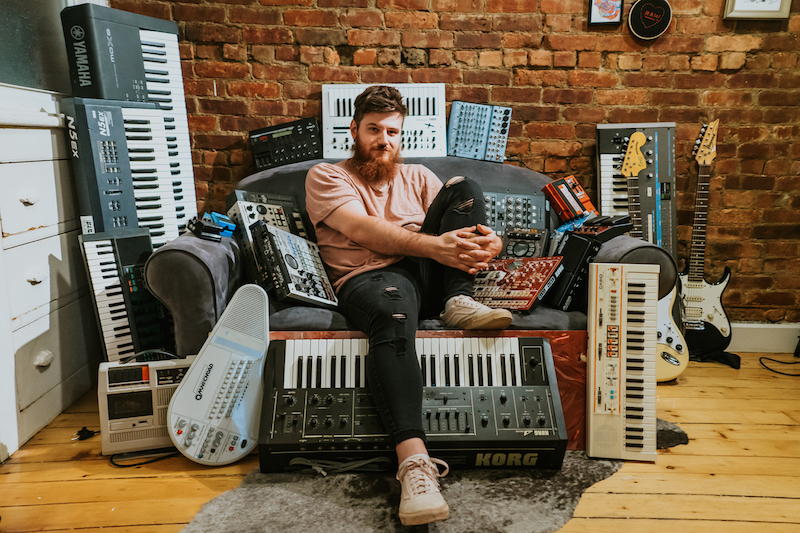This article first appeared in The Alt on April 3, 2018.
Photo by Kiki Vassilakis
When Promise Soto was a child, he would come home from school each day, drop his things at the door and go into his room to write for hours. He wrote short stories and poems about playing outside, watching a grasshopper making its way through the backyard or his mother’s cigarette laying on an ashtray, burning right down to the filter. If a pen and paper were nearby, Promise was creating a story.
“I was a real silent kid,” Soto says. “A lot of my stories had to do with perseverance. I’ve always had this dream, since I was a child that I wanted to be this big name person and I always wrote down ideas and ways for me to do that.”
Born and raised in Schenectady, Soto was born to teenage parents who continue to be major influences in his creative life. Since 2015, the 24-year-old has channelled his love for storytelling into a prolific hip hop career as Promise the Unbreakable. In the short span of three years, he has released 15 music videos, eight mixtapes and has taken the stage nearly 30 local performances. None of it would have been possible without the influence of his father.
“Music was his passion,” he says. “But he had to do what he had to do to take care of his kids.”
While he never got his chance to pursue an industry-level hip hop career, his father built his own in-house studio, recording on old school tape decks when Soto was about three years old. The toddler would spend hours in the studio with his father, playing with all of the knobs and buttons.
“Rather than yelling at me he sat down with me and showed me how to do it,” Soto recalls. “He introduced me to writing music, it gave me something to focus my poetry and writing on, to put it to rhythm. From there I couldn’t stop doing it. I love it to death, it’s my life, but it really started from seeing my father not get his chance… I just wanted my dad to get what he wanted.”
When he started communicating with other young creatives through Prince Sprauve’s after-school program at Schenectady High School, Soto dove into the pop-rap genre, enjoying the chance to play with melodies. His mother had instilled in him the values of imagination and positive thinking that, for Soto, didn’t live in the world of gangster rap. Once he found his sound, the artist set out to master the production aspect he had been playing with since childhood. At 18 years old, with a job and a three-year-old daughter at home, he began attending the New School of Radio and Television at University at Albany to study audio engineering and digital arts.
“It hit me that ‘Hey, I gotta get up and do something with myself before it’s too late’” Soto says. “That’s where I learned how to put a studio together, how to engineer. That led into me video editing, shooting videos and commercial stuff. At that point, I felt like I really didn’t need to go to a studio or someone else for this stuff, I could do it myself.”
In 2015, Soto had finally put the pieces together, releasing his first mixtape, “Under Judge or Understand Me” on June 5, the same day of his first show in Sprauve’s “The Red Vent” mixtape event at Proctors Theater. He’d also landed on a name for himself: Promise the Unbreakable, inspired by his childhood nickname of “Future P” and his ability to overcome a serious bout of depression following his separation from his daughter’s mother.
“For a couple of months I was trying to rebuild my mentality, going to school and working at the same time, it was really hard to balance all of them. Adult life kind of hit me…It’s an everlasting battle. There’s no reason to mope or cry over spilled milk,” he says. “That’s when I realized that was the hardest point in my life and it didn’t break me. It just clicked. The name I had been trying to find for myself forever happened to find me through a real life situation. I’m still here, and I use that name as a platform for everybody else, trying to instill that mentality for other people. Be unbreakable.”
“My birth name is Promise, a lot of people don’t know that,” he adds, grinning. “My dad named me that as a promise to my mom, that he would always be there, and they’ve been married over 24 years. So he kept his promise and I’m keeping mine: Not to break.”
Since the drop of his first project, Soto has continued to self-release his mixtapes with the help of a close-knit production team, which includes two cameramen and two beat makers. Melvin Williams, Soto’s best friend since middle school, directs every video and Leon Bands (Leon Bandz TV) is in charge of interview clips and performance recordings. Jumanji Beats has produced several tracks with Soto and Noe Won Made This Beats produced the entirety of his 2017 Welcomes, In Advance mixtape.
While he has skills the produce his own music, Soto opts to distribute tasks to his crew. As an artist, he says, his priority is to help elevate not only his own work but the work of his community. He’s taught this small team everything he knows, so that they could work together to share their ideas more efficiently and use their new knowledge in production in their own projects.
“It’s a balance between understanding the crafts—engineering, beatmaking, composing, writing, performing—and being able to communicate all the ideologies surrounding that to another engineer,” he explains. “No one wants to do everything themselves. If you’re recording and producing all your own beats, how do you have time to practice for your own shows?”
To Soto, his knowledge is invaluable, something he hopes all of his fellow artists will take the time to pursue.
“As an artist, nobody else in the world can produce what you want like you can. No one can see your vision. You hear it in your head but you want to know how to communicate that to your engineer,” he says. “Pro Tools is like [$300], get some plugins for about $100 and just experiment. Even if the final result isn’t recording yourself, at least practice with yourself so you understand some of it. Then, no one can ever use you. If you have an understanding of music theory, you can approach anyone in the business. It’s important.”
As Promise the Unbreakable, Soto is a key player in the current 518 hip hop scene, made up of a group of talented artists whom he says has led a renaissance of unification. They buy up tickets to attend each other’s shows and feature on each other’s songs.
“Before like 2015, it was real aggressive and people weren’t supportive of each other, they’d rather battle it out—Albany vs. Schenectady and Troy and blah blah blah,” he says. “When us younger guys came in, we were like, ‘Screw all of that, we’re about to unify the whole city.’ A lot of these artists, we all grew up together, fell in love with music and we didn’t realize it until we were all like 16 and came right back together.”
Soto has dreams that the Capital Region will be a major player in the national music scene within the next few years. Over the past five years, he observes, venues have been more open to diverse acts instead of relying on soft rock and folk. Artists have made a point to make their shows a safe environment to perform in—where audience members can either respect the space and enjoy the show or be asked to leave.
“I’m trying to make our own 518 record company, not locking artist up but a collective, a community,” he says. “I want us to be doing it the right way. I’ve been to a show in Atlanta where just because some guy didn’t do a song with another guy he went to that show and really destroyed it and now they can’t do hip hop shows at that bar. Stuff like that really ruins it for the rest of us. I don’t want people to look at us out here the same way. I don’t want that type of energy for us. I want us to be one combined power with this music stuff. I want people to be like, ‘Yo 518, everyone goes out there.’”
This kind of landmark opportunity can only happen if passionate artists continue to rise. For Promise the Unbreakable, the only way to make that happen is to keep churning out quality music.
Most recently, the artist dropped his “Where I Been” video from his September 2017 Welcomes, In Advance mixtape. He’s set to release a second video for that tape, “Round Table Music” featuring Ace, in the next few weeks.
“People love ‘Where I Been,’ sometimes I don’t even perform it because people are performing it for me. It ended up being such a spectacular video,” he gushes.
Relative to his heavy output of music and video content over the last three years, it’s been a while since Promise the Unbreakable has released a mixtape, but fans won’t have to wait long for his 2018 drop. His new 50-track project is expected towards the end of May, joined by a short film and three videos. His team will be hunkering down for the entire month of April to tackle the beast.
Joking about his “light case of OCD” the artist describes his heavy output as a need to spread his creative energy out evenly. He shoots for two mixtapes a year, one appealing to his hardcore rap fans, the other gravitating towards pop, R&B and soul. By winter of 2018, his 50-track rap album will be joined by a collaborative “album-sounding” mixtape with Noe Won Made This Beats and Jumanji Beats. The project will likely be at the same (if not more) track count, in which Soto aims to team up with “every artist in the 518.” The project will be his tenth mixtape and he is currently in the works to trademark his name, brand and tracks to sell as albums.
“I like to put it out because it sort of acts as motivation to other artists, like ‘Oh Promise is putting out new stuff, I should get on mine,’” he shrugs. “And we keep building.”
This fall, the artist will be traveling back and forth to L.A. where he has meetings set with members of Interscope Records, as well the A&R executive of Epic Records. “I’m hoping one of these things picks up and I can come back to the city and be like, ‘Yo, we made it!’ I don’t want to be signed as an artist but I want to be known by other artists.”
As a performer, Promise the Unbreakable has the intensity and drive of someone with serious star power. There is a fierceness behind his eyes that can—in a moment—morph into a contagious smile that conquers every aspect of his body language. The dreaming, poetic childhood persona of Soto is still very much present in his work, even in its most intense moments.
“A lot of people who listen to my music think that I’m being negative but it’s not that. It’s just that I’m being focused on building on myself and I enjoy talking about the life that I’m building,” he explains. “All my songs have some type of message, even my more hardcore songs have a reason behind it if you’re listening to it. I want you to absorb something from this.”





